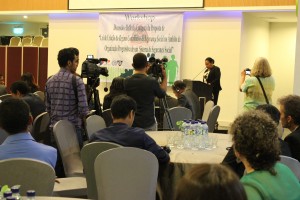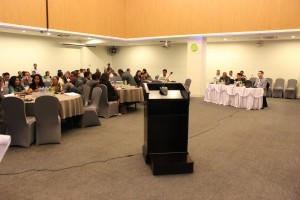Ministry of Social Solidarity discusses Social Welfare Contributory Framework

The Ministry of Social Solidarity (MoSS), through the National Directorate for Social Welfare Contributory Regime, promoted a seminar in order to discuss the law proposal for the establishment of a Social Welfare Contributory Regime and the importance of the existence of a Social Welfare system for every worker in the country. The law proposal was approved by the Council of Ministers, and will then be submitted to National Parliament for approval. The event took place this Wednesday, February 24th, 2016, at the Timor Plaza hall, in Comoro, Dili.
Aiming to contribute for the establishment of an integrated Social Protection system, the Social Welfare framework, suggested by MoSS, aims to complement an already existing but limited protection framework. Up until now, it consisted only in non-contributory benefits, such as the Elderly and Disabled Support Pension, the “Bolsa da Mãe” programme and pensions foreseen in the Social Security transitional framework.
The Minister of Social Solidarity, Isabel Amaral Guterres, pointed out that the “Social Welfare Contributory Framework law proposal states that every worker shall contribute, every month, with a small part from her/his salary, in order to get it back when needed. They will then be entitled to receive social allowances, for example, when they are on maternity or paternity leave, if they become unable to work or when they reach retirement age, now foreseen at 60 years of age.”
It is aimed that this Social Welfare framework finances itself: expenses with social allowances shall be completely covered by the workers’ contributions and from those to whom they work during their work life. The system is based on the income replacement principle, by allowing that, when it stops for any reason, people may still be able to continue to consume, and, therefore, ensure their survival and keep the economy flowing.
The Minister added that “this proposal will replace the current transitional framework applicable to public servants. And that it is considered that the Social Welfare framework shall be unique and for every worker, including those from the private sector, for, according to the Constitution, every citizen has the same rights.” Considering the overcoming difficulties from its entry into force, it is expected that some of these measures will be introduced gradually.
The Civil Service Commissioner, Maria Domingas Fernandes Alves, insisted that Social Welfare, connected to social assistance, is a right under the 56th article from the Constitution of the Democratic Republic of Timor-Leste. She explained that “the social protection to which everyone is entitled is ensured when the State supports its citizens through non-contributory social benefits [allowances taken directly from the General State Budget] or through pensions under the contributory framework [which will get money from savings made by employees and employers during their work term]”.
 She still recalled that the transitional framework, exclusive for public servants, which is applicable since 2012, is, currently, completely non-contributory, i.e. fully financed by the General State Budget.
She still recalled that the transitional framework, exclusive for public servants, which is applicable since 2012, is, currently, completely non-contributory, i.e. fully financed by the General State Budget.
After this law is approved, the Civil Service Commission shall suggest a diploma to set the State’s upper working age limit, in order to allow people to retire. Currently, there are civil servants not willing to retire because of income loss (the current pension is only 75% of the average salary).
At the seminar, where social protection and Social Welfare were openly discussed, were also present the Vice Minister for Social Solidarity, Miguel Marques Gonçalves “Manetelu”, Members of National Parliament, Members of Government, a representative from the Bangkok Branch of the International Labour Organization, the Interministerial Workgroup for Social Welfare, officials and technicians from MoSS.










































